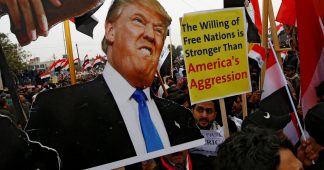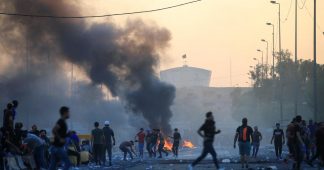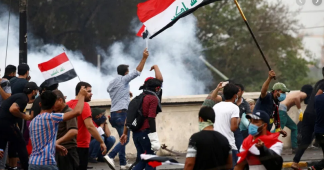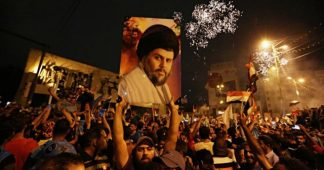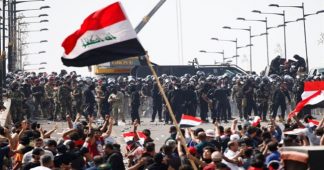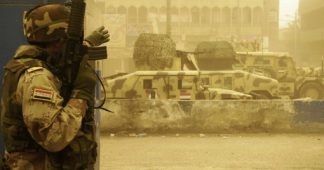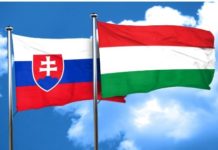By Jean Shaoul
28 January 2020
Iraq’s caretaker Prime Minister Adel Abdul Mahdi ordered a brutal crackdown on peaceful mass demonstrations that erupted on Friday. Protesters chanted “get out, get out, occupier,” and called for the immediate withdrawal of US troops from the country.
For the last three days, security forces have fired teargas and live ammunition, killing at least 12 people and wounding dozens more in the capital, Baghdad, and in the southern cities of Basra, Nasariyah, Dhi Qar and Diwaniya, in a bid to disperse the protests.
According to the Iraqi High Commission for Human Rights, more than 500 people have been killed since the protests began on October 1 with several rights groups accusing security forces of using excessive force. There have been reports of kidnappings, torture, snipers on rooftops and armed gunmen in drive-by shooting of protesters.
The protests, sparked by unemployment, particularly among young people, the lack of electricity and water, poor services and rampant corruption, rapidly escalated, with calls for the government to resign, a new prime minister independent of the main political blocs, fresh elections, an end to the sectarian-based political system and the prosecution of those implicated in corruption and the killing of protesters.
While the protests have mainly taken place in Baghdad and nine predominantly Shia provinces, they have generally been supported by Sunni Iraqis. Most of the Sunni politicians, however, have remained silent over the protests.
Although Abdul Mahdi resigned last month, he remains in office until a new prime minister is appointed. Candidates nominated by the government have been rejected by the protesters as being too close to the old corrupt setup. But a new prime minister must have the support of the largest bloc, Sairoon, led by populist Shiite cleric Muqtadr al-Sadr, as well as Hadi al-Amiri’s Fatah bloc that is closely linked to the Hashd al-Shabi, or Popular Mobilization Forces (PMF) militia, that is aligned with Iran. These blocs fear that under a more politically independent politician, they will lose their own power and influence, not to say access to the country’s oil resources.
The crackdown came just hours after Moqtada al-Sadr withdrew his support for the “million strong march” he had called on Friday, amid fears that the protesters might attack the presidential palace or the heavily-fortified Green Zone that houses the US embassy and other foreign missions. He said he was ending his support—always qualified—for the anti-government demonstrations, as part of his bid to retain political control over the government and choice of prime minister and so avoid fresh elections.
Al-Sadr has millions of supporters in Baghdad’s poorest neighbourhoods and the south and heads the largest political bloc in Iraq’s parliament, which holds several ministerial posts. Al-Sadr, who has long sought to balance between Washington and Tehran, has found it increasingly difficult to contain his supporters’ hostility to the corrupt politicians that have ruled the country since the US-led invasion of Iraq in 2003. His support for Friday’s demonstration was aimed at bolstering his own support, while keeping anti-US sentiment under control.
Anger was fuelled by Iraqi President Barham Salih’s meeting with US President Donald Trump at Davos last week, a clear sign that Salih wants US troops to stay in the country. This flew in the face of a parliamentary vote taken in response to mass pressure for the expulsion of all US forces from Iraq in the wake of the US drone missile assassination of Iran’s General Qassem Suleimani, along with Abu Mahdi al-Muhandis, a prominent member of the Iraqi government and leader of the Popular Mobilization Forces, the umbrella group of predominantly Shia militias funded by the Iraqi government.
The US murder of Suleimani, who had been invited to Baghdad by Abdul Mahdi to discuss attempts to ease regional tensions between Iran and Saudi Arabia, and al-Muhandis, together with eight other Iraqis and Iranians, at Baghdad’s international airport on January 3 was an unprovoked act of war against Iran and Iraq. It provoked furious opposition from the Iraqi people across the sectarian divide to any outside interference in Iraq—whether by the US, Iran, Israel or Saudi Arabia.
Despite this, most of the leaders of the main political blocs, including the Kurds, Sunnis and Shiite leaders al-Sadr and Grand Ayatollah Ali al-Sistani, supported Salih’s meeting with Trump, who has made clear that should Iraq insist on the US leaving Iraq, then Washington will impose punishing sanctions.
On Saturday, shortly after al-Sadr’s announcement, his supporters, the best-organised of the anti-government demonstrators, immediately began to dismantle their tents and leave the protests in recognition that the security forces, in the absence of al-Sadr’s political cover, would use it as a green light to crush their movement. Within hours, riot police tried to storm protest camps set up across the capital and in the south, removing concrete barriers near Tahrir Square where anti-government demonstrators have camped out for months, and used tear gas and live ammunition to disperse the activists.
This served to fuel the protests, with thousands of university and school students taking to the streets in Baghdad, Basra and Nasariyah. In Basra, protesters issued a letter circulated on social media calling on al-Sadr to reconsider his decision to withdraw his support for the demonstrations. Al-Sadr’s move prompted one of his associates, Asaad Al-Nasiri, to split from the movement, announcing his support for the anti-government protesters, saying, “I will take off the turban for the love of Iraq and the city of Nasiriyah and the revolutionaries, and I am with the Iraqis.”
On Sunday evening, there were reports that three rockets had “directly hit the US embassy” in Baghdad’s heavily fortified Green Zone, with one rocket hitting a cafeteria at dinner time, injuring at least three people. A further five rockets crashed into a riverbank near the embassy, without causing any injuries. This would, if confirmed, mark the third attack on the embassy or Iraqi military bases where American troops are deployed this month and the first direct hit. All the pro-Iranian militias have denied any role in this attack, claiming they did not target the embassy.
Abdul Mahdi condemned the attack, saying that if such acts continued, they could “drag Iraq into becoming a battlefield.” The US State Department said, “We call on the Government of Iraq to fulfil its obligations to protect our diplomatic facilities.” Washington wants the prime minister to curb the pro-Iran militias, but he, and any candidate to succeed him, is dependent upon their political support.
According to Middle East Eye, it is this mounting impatience with the Iraqi government, along with the calls for the expulsion of US troops from the country, that is behind Washington’s discussions with Sunni and Kurdish leaders about creating an autonomous Sunni region in western Iraq, similar to the Kurdish autonomous region in the north of the country. It would include Anbar province as well as the provinces of Nineveh and Salah al-Din, and part of Diyala.
Its purpose would be to sever Iran’s land bridge through Iraq and Syria to Lebanon and the Mediterranean, a proposal was first mooted by Joe Biden, who is seeking to become the Democratic Party’s presidential candidate, in 2007, as a means of limiting Iran’s influence in the region. It is believed to have the support of the Gulf states, led by Saudi Arabia and the United Arab Emirates.
Published at https://www.wsws.org/en/articles/2020/01/28/iraq-j28.html
Credit: AP Photo
